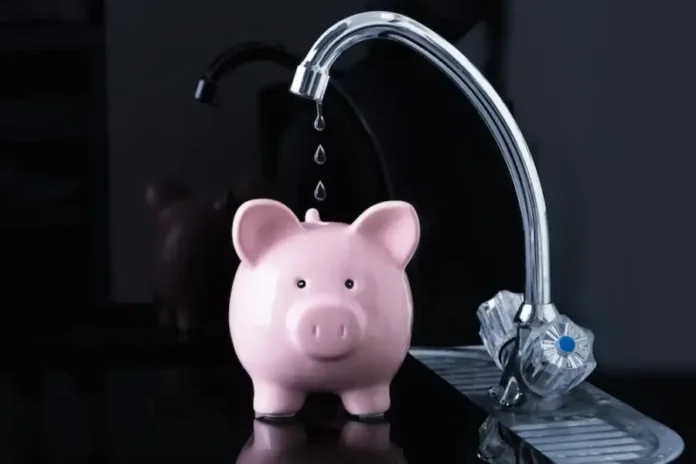Opening your monthly water bill to find the amount owed has skyrocketed can be a shocking experience. It’s like expecting a gentle rain but getting a downpour instead. You wonder, “Why is my water bill so high all of a sudden?” The culprit behind this unexpected surge often lurks hidden within the walls of your home or beneath your garden: plumbing leaks. In this article, we’ll dive into the often-overlooked world of plumbing issues that can lead to a High Water Bills, offering insights and solutions to help you detect and fix leaks, saving water and money.
Understanding Your Water Bill
Before we dive into the depths of plumbing leaks, let’s take a moment to understand our water bill. Much like reading a weather forecast, deciphering your water bill gives you insight into your household’s water consumption trends. By comparing your current bill with past ones, you can spot unusual patterns that might indicate leaks.
Common Signs of Plumbing Leaks
Spotting a plumbing leak early can be as obvious as noticing a wet spot on the floor or as subtle as hearing the faint sound of water running when all taps are closed. Other tell-tale signs include:
- Unexplained increase in water bill
- Musty odors indicating dampness
- Mold or mildew in unexpected places
- Cracks in the foundation or walls
DIY Leak Detection
Think of yourself as a detective when looking for leaks. Start with easy checks like inspecting faucet gaskets and toilet flappers. A simple dye test in the toilet tank can reveal silent leaks that quietly escalate your water bill.
The Silent Culprits: Hidden Leaks
Some leaks play hide and seek, existing out of sight and mind until they cause significant damage. Areas prone to hidden leaks include under sinks, in crawl spaces, and behind walls. Regular inspections in these areas can prevent unexpected surprises.
Fixing Leaks: DIY vs. Professional Help
While some leaks can be fixed with a few tools and a YouTube tutorial, others require the expertise of a professional plumber. Knowing when to call in reinforcements is key to effectively addressing the issue.
Preventative Measures to Avoid Future Leaks
Prevention is always better than cure. Regular maintenance, such as inspecting pipes and installing water detection alarms, can save you from future headaches and high bills.
The Impact of Small Leaks on Your Water Bill
It’s astonishing how a drip a second from a leaky faucet can add up to gallons of water wasted daily. These seemingly insignificant leaks can be the dark horse of high water bills.
Innovative Solutions for Leak Detection
Technology offers a helping hand in leak detection, with smart home devices that monitor water usage and alert you to unusual patterns indicative of leaks.
The Role of Water Usage Monitoring
Keeping an eye on your water usage can be as enlightening as monitoring your finances. It helps identify not just leaks but also areas where you can conserve water.
Landscaping and Outdoor Leaks
Outdoor leaks can be even more elusive, hiding in sprinkler systems or hose connections. Regular checks can prevent these outdoor leaks from inflating your water bill.
The Cost of Neglect: When Small Leaks Lead to Big Problems
Ignoring a small leak is like ignoring a small crack in a dam—it can eventually lead to a flood of problems, including structural damage and mold growth.
Saving Money and Water with Simple Fixes
Many leaks can be fixed with simple solutions, such as replacing washers or tightening connections. These minor repairs can lead to significant savings on your water bill.
Conclusion
Tackling the issue of a high water bill requires a blend of vigilance, knowledge, and timely action. By becoming more aware of the common signs of leaks, taking preventative measures, and utilizing both DIY and professional resources, you can protect your home from the silent menace of plumbing leaks. Remember, every drop counts, and saving water not only benefits your wallet but also the environment.
FAQs
1. How can I tell if a plumbing leak is responsible for my high water bill?
Look for signs like unexplained increases in your bill, visible water damage, or the sound of running water when all taps are off.
2. Are there any simple methods to detect a leak in my home?
Yes, you can perform a dye test in your toilet tank or check for damp spots under sinks and around appliances.
3. Should I attempt to fix leaks myself or hire a professional?
For simple leaks, a DIY approach might work. However, for complex issues or hidden leaks, it’s best to hire a professional plumber.
4. What preventative measures can I take to avoid leaks?
Regular inspections, replacing old piping and fixtures before they fail, and installing water detection devices can help prevent leaks.
5. How do outdoor leaks affect my water bill, and how can I detect them?
Outdoor leaks, such as in sprinkler systems or hose bibs, can significantly increase your water bill. Regularly inspecting outdoor fixtures and monitoring your water bill for unusual increases can help detect these leaks.
For more information, visit ApzoMedia






























































